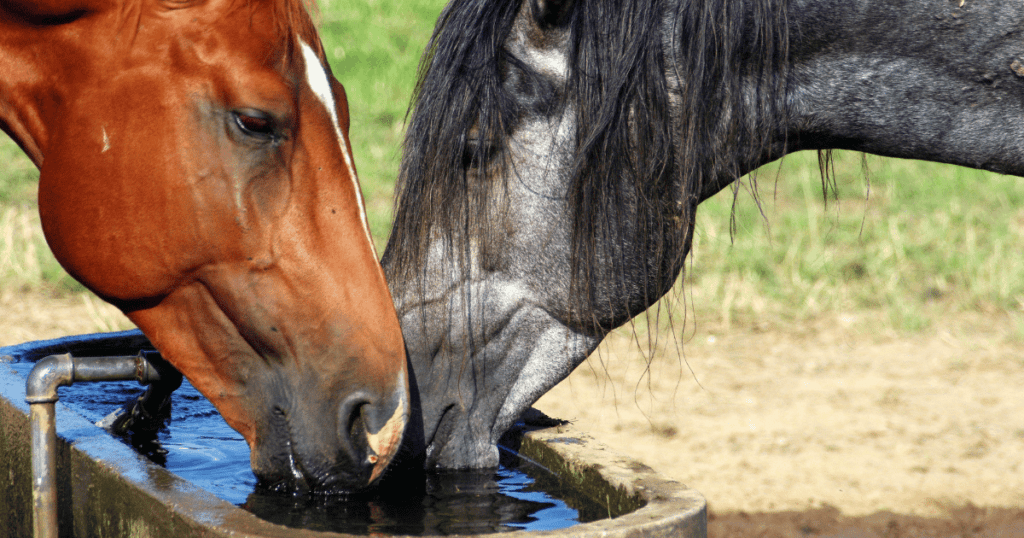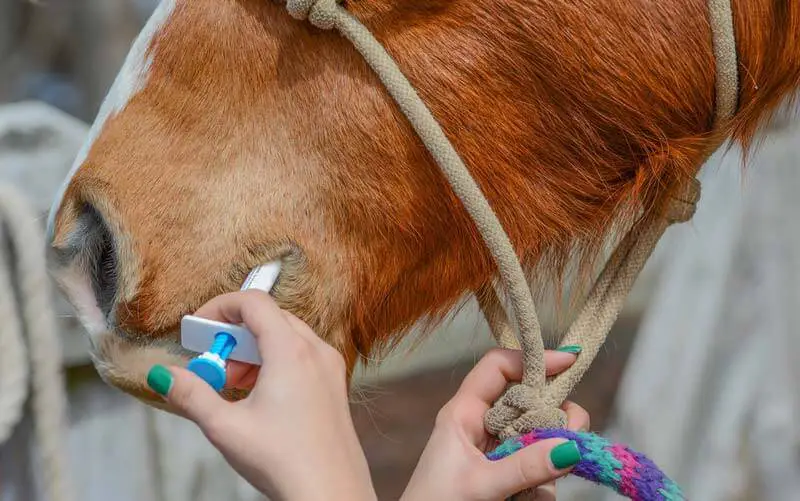The Summer heat can take a toll on your horse’s health and ability to perform. Dehydration, from mild to severe, is best avoided. However, in this article, we explain the signs of dehydration and what you can do to Keeping Your Horse Hydrated During Summer.

Keeping Your Horse Hydrated During Summer
Just like humans, horses produce sweat to assist with temperature regulation. Sweat is made up of water and electrolytes – namely sodium, chloride, potassium, calcium, and magnesium – that are lost during evaporation and must be replaced.
Providing your horse with unlimited access to fresh, clean water 24 hours a day is imperative to their all-round health and even more so when the weather warms in Summer. The amount of water your horse needs will vary depending on the temperature and their activity level.
Signs of Dehydration
The longer Summer days encourage us to spend more time with our horses, but it’s vital we learn to recognize dehydration. There are three ways to determine if your horse is dehydrated:
- Slow capillary refill – A dehydrated horse will have dry gums and a capillary refill time of more than three seconds; that is, the time it takes for the gums to return to pink following moderate finger pressure.
- Prolonged skin tent – A normal, hydrated horse’s skin will return to place instantly when pinched on the neck area. In contrast, a dehydrated horse’s skin will remain tented for several seconds or even longer.
- Darker urine – Just like us, a dehydrated horse will have more concentrated urine that is darker in color and more pungent in scent than normal. In essence, the darker the urine, the more dehydrated the horse is.
Hydrating your Horse

Often, your horse will readily drink water at home but may become picky when out on a trail or at a show. There are several steps you can take to Keeping Your Horse Hydrated During Summer, including:
- Add a palatable flavor to your horse’s water if they’re refusing to drink while at a show. It can also help to add this ingredient to their water a few days prior or even bring water from home in a large portable container. However, remember plastic containers can also alter the taste.
- Offer your horse fresh, clean water at the end of each class. If you’re concerned about your horse drinking too much water too quickly, simply offer them a quarter of a bucket at a time, then leave them with a full bucket once their initial thirst is quenched.
- To keep your horse cool throughout the day, a cold water hose can work wonders. Rinse them thoroughly and use a sweat scraper to remove any excess water. If you don’t use a sweat scraper, your hosing will have the opposite effect and trap heat instead.
- Allow your horse to rest in the shade between classes and leave them with a full bucket of water to drink from as they like at all times.
- If you’re on a trail, choose water sources that appear fresh, clear, cool, and free from odor. You can also give your horse short breaks to graze as grass contains moisture.
- Finally, a physically intense workout or competition day can deplete your horse’s electrolyte levels. Only replace electrolytes following intense training or exercise, as electrolytes given prior will simply be excreted in your horse’s urine.
Conclusion
Keeping your horse hydrated during Summer is essential for their well-being and performance. Dehydration can have serious consequences, such as colic, muscle cramps, fatigue, and even organ failure. Therefore, it is important to monitor your horse’s hydration status and provide them with adequate water and electrolytes. By following the tips in this article, you can help your horse stay cool, comfortable, and healthy in the hot weather. Remember, a hydrated horse is a happy horse!



